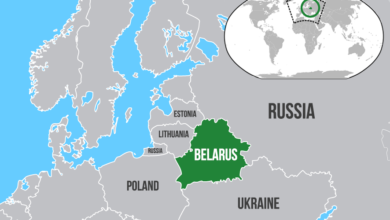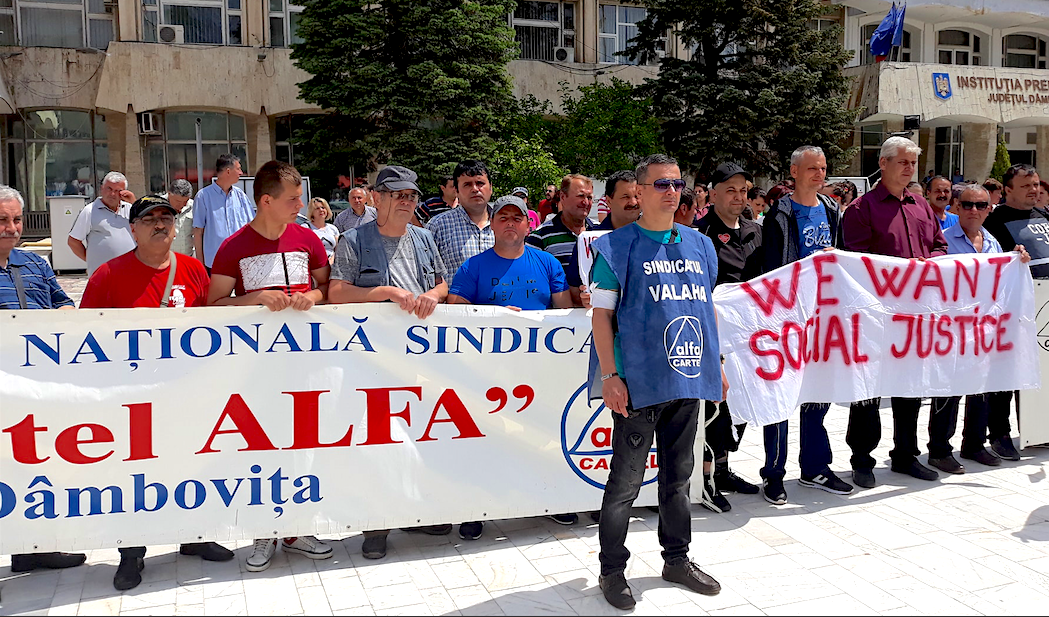“Enough is enough!” shouted 89-year-old anti-fascist hero
Manolis Glezos, choking under a cloud of tear gas. “They have no
idea what an uprising by the Greek people means. And the Greek people
… have risen.” Glezos, famous for tearing down the swastika that
flew over the Acropolis as a member of the communist-led anti-Nazi
resistance during World War II, was one of the hundreds of thousands
of Greek workers who took to the streets Feb. 12 and subsequently to
protest a devastating new round of austerity measures.
Workers forced to pay for capitalist crisis
Ostensibly, the measures are meant to address the Greek
government’s enormous debt burden. Under intense pressure from the
International Monetary Fund, European Central Bank and European
Union—Greece’s main lenders, often referred to as the troika—the
Greek Parliament accepted the austerity by a 199-74 margin. As a
result, the minimum wage—which is used as a baseline to determine
many workers’ salary—will be reduced by 22 percent (32
percent for workers under the age of 25), pensions will be slashed,
workers’ collective bargaining rights will be significantly
weakened, and many other gains won through generations of struggle
will be rolled back.
In return, the Greek government was promised a 130 billion euro
bailout from the troika in order to avoid going bankrupt after March
20, when bonds worth 14.5 billion euros will mature. This is in
addition to the 110 billion euro bailout it received in 2010, which
has since been used up servicing the country’s massive debt.
Another major component of this most recent attempt to prevent a
Greek default is private sector involvement, also called a “haircut.”
Under the private-sector involvement plan (PSI), banks voluntarily
agree to a 50 percent reduction in the face value of their investment
in Greek debt. According to a plan adopted in principle at an October
2011 European Union summit, the haircut, coupled with enormous
austerity and privatization, is aimed at bringing down Greece’s
debt from 160 percent of GDP to 120 percent by 2020.
The Greek government had to commit to the terms of the new bailout
from the troika before beginning to implement PSI. Even still, too
few banks have signed on for the haircut to be effective. The Greek
government will have to apply collective action clauses, which forces
all creditors to comply if a decision is made by the vast majority.
Several international credit rating agencies have said that they
would consider this a selective default, which would trigger the
payment of credit default swaps (a means of insuring against
defaults) and potentially further destabilize the eurozone—the 17
countries that use the euro as their official currency.
Crises inevitable under capitalism
Bourgeois media outlets around the world have concealed the cause
of the crisis in Greece. The most common explanation is that the
Greek working class enjoyed excessive benefits without working hard
to earn them. According to this presentation, it was the Greek
government’s fault for not standing up to the workers and curbing
social spending before deficits got out of hand.
This narrative is absurd on multiple levels. First and foremost,
the working class creates all the wealth of society, while the
parasitic capitalists perform no socially necessary labor whatsoever.
If anyone is lazy and pampered, it is the ruling class, not the
workers.
Furthermore, periodic crises are inevitable under capitalism. As
capitalists attempt to maximize profits, they produce an ever greater
number of commodities while paying workers less and less. As a
result, there are fewer and fewer people with the purchasing power to
consume the commodities produced. When this contradiction reaches a
breaking point—for example when the housing bubble burst in the
United States—a crisis ensues not because there is not enough to
meet everyone’s needs but because there is an abundance of
commodities that cannot be sold for a profit.
There are particularities of the situation in Greece that makes
its debt problem especially severe, including a tradition of massive
tax evasion by the wealthy, but the roots of the crisis lie in the
structure of the capitalist mode of production itself.
The labor movement responds
Although the austerity measures were ultimately passed, the
working class mounted a massive response. The three main forces in
the Greek labor movement are the GSEE, which organizes private-sector
workers, ADEDY, which organizes public-sector workers, and PAME, the
union federation affiliated with the Communist Party of Greece (KKE).
GSEE and ADEDY are generally more conservative, while PAME pressures
them to take more militant action and puts forward the revolutionary
slogan: “Worker, without you no cog can turn. You can do without
the bosses.”
The first mass act of resistance of the new year took place on
Jan. 17, when an Athens-wide general strike took place to protest the
new austerity package. The struggle was escalated with mass rallies
organized by the KKE and PAME and a national general strike on Feb.
7.
The largest action took place in the immediate run-up to the
approval of the new measures. The labor movement called for a two-day
general strike on Feb. 10 and 11 and a mass demonstration outside
parliament in the evening of Feb. 12, the date of the vote.
Large demonstrations were held on both days, which included
militant actions in addition to mass marches. On the first day of the
strike, PAME members took over the headquarters of the Labor
Ministry. On the second day, Communist Party cadre dropped two giant
banners from the Acropolis, reading “Down with the Dictatorship of
the Monopolies [and] European Union.”
The actions culminated with one of the largest demonstrations in
Greek history, as hundreds of thousands of workers massed in Syntagma
Square in front of the Parliament building, including tens of
thousands who joined the huge PAME contingent. To break up the
protest, agent provocateurs sought to break the discipline of the
demonstration while police exhausted their entire reserves of tear
gas. Despite this brutal repression, the outraged workers stood their
ground for hours.
Their militant resistance was continued inside Parliament by the
KKE deputies. George Mavrikos, the head of the World Federation of
Trade Unions and Communist Member of Parliament, threw his copy of
the proposed law at Finance Minister Evangelos Venizelos when he
attempted to give a speech.
Much of the capitalist media’s attention has been focused on the
rioting that took place that night, after the mass demonstration had
dispersed. On the one hand, it is incredibly hypocritical for the
architects of the austerity measures, which constitute a profound act
of violence against the entire Greek working class, to denounce their
opponents for being violent.
On the other hand, the organized left, especially the Communist
Party, has been sharply critical of the rioters. They argue that
indiscriminate destruction does nothing to advance the class struggle
and plays into the ruling-class narrative that the people face the
choice between austerity or chaos.
Faced with devastating attacks by the capitalist class, it is
natural that mass anger will explode into uprisings at certain
points. However, that the rioting only lasted one night and
senselessly targeted historic landmarks makes it appear that much of
the violence was carried out by undercover provocateurs.
Greek workers turn to the left
The mass struggle has profoundly altered the consciousness of the
Greek working class and has led to a collapse in support for the
traditional capitalist political parties. This is most striking when
it comes to the social democratic party PASOK, which ruled the
country from 2009 to 2011 and participates in the current government
of Lucas Papademos, a so-called non-partisan “technocrat” and
former European Central Bank vice-president installed as prime
minister in November. In the 2009 election, PASOK won 44 percent of
the vote and a majority in Parliament. An opinion poll taken
immediately after the austerity vote showed PASOK in fifth place with
just 11 percent support.
The two other participants in Papademos’s coalition are also
polling poorly. In the same survey, the conservative New Democracy
party placed first but with only 27.5 percent support, significantly
less than they received in 2009. The semi-fascist Popular Orthodox
Rally (LAOS) was supported by just 4.5 percent of respondents as they
were abandoned by much of their base for the openly neo-Nazi Golden
Dawn party, which is hovering around the threshold for entering
Parliament.
Conversely, the three parties to the left of PASOK that, to
varying degrees, opposed the bailout have experienced an explosive
increase in support. The Communist Party of Greece is polling in
third place with 14 percent, followed by the Coalition of the Radical
Left (SYRIZA) with 13.5 percent. SYRIZA is an umbrella group composed
primarily of small communist tendencies and reformists who split from
the KKE at various points. It has stopped short of calling for a
revolution and exit from the European Union, instead putting forward
more timid demands such as a moratorium on debt payments.
Consistently ranked second in the polls is the newly formed
Democratic Left party. Formed as a right-wing split from SYRIZA in
2010, it has replaced PASOK as the largest self-identified leftist
force in the country. Although they rhetorically opposed the
austerity measures, Democratic Left has indicated that it would not
hold firm to this position if in power.
The combined support for the three parties of the left and the
three parties of the governing coalition is roughly even. This is
unprecedented in Greek history and amounts to more than triple the
vote the parties to the left of PASOK received in 2009. As a result,
the leaders of the European Union have been demanding more and more
political guarantees, anticipating the results of elections expected
to take place in April. LAOS leader George Karatzaferis typified the
panic of the ruling class when he expressed fear that “Greece will
set alight the fire of the European revolution.”
Inter-imperialist tension
While the political drama played out, economic conditions continue
to worsen. Recent statistics show that the Greek GDP fell nearly 7
percent in 2011, even worse than most economists had expected, and
the country is now staggering into its fifth consecutive year of
recession. The most recent official figures show unemployment at 20.9
percent.
A recently released study on the prospects of the Greek economy
commissioned by the troika predicted that the debt reduction targets
will be missed by a considerable margin. Without further assistance,
the report predicts the debt-to-GDP ratio to be 129 percent by 2020
and offers a plausible worst-case scenario of the debt level
remaining unchanged at 160 percent at the end of the decade.
In reaction to the deepening severity of the situation, the
European bourgeoisie has taken precautions to prepare for what they
consider to be the very real possibility of a total Greek default.
This includes building a “firewall” around Greece—limiting
exposure to Greek debt and implementing safeguards to protect
vulnerable eurozone economies from a possible contagion.
Sections of the capitalist class now seem to be sympathetic to the
idea that it would be less expensive to allow Greece to go bankrupt.
Phillip Roesler, the German economy minister, prominently said in the
run-up to the recent austerity vote that “D[default]-day is less
and less scary.”
At the same time, the European Union is witnessing the emergence
of increasingly sharp divisions. A German-French bloc has emerged as
the dominant force in the EU, and the countries that managed to
maintain the coveted AAA credit rating have taken a hard line in
recent months against weaker economies like Italy, Portugal and
Spain. The British are marginalized in this new power equation after
refusing to sign on to an agreement to impose strict budget controls
on a Europe-wide basis.
Deal approved, struggle continues
A final decision on the bailout package was made at a Feb. 20
meeting of eurozone finance ministers. They agreed that Greece had
met the necessary conditions, but that a strict regimen of
international monitoring and oversight should be implemented to
guarantee that the devastating austerity measures are implemented in
practice.
Instead of going into the Greek government’s
general fund, the bailout money will be paid into a special escrow
account. The eurozone agreement states that Greece has to amend its
constitution so that when the government taps into this fund,
priority must go to servicing the country’s debt. In addition, the
troika will establish a permanent headquarters in Greece to closely
enforce compliance with the terms of the bailout.
The crisis in Greece is falling into a predictable pattern. The
troika offers the Greek government desperately needed funds in return
for massive austerity, which the Greek bourgeoisie presents to the
working class as a final sacrifice needed to save the country from
bankruptcy and chaos. The Greek economy then fails to live up to the
unrealistic expectations of its creditors, and the cycle repeats.
While it is impossible to predict the emergence of a revolutionary
situation, this cycle of growing misery and perpetual economic
decline cannot continue forever. The enormous, militant mobilizations
and growing radicalization in recent weeks shows that the working
class has no intention of capitulating.






